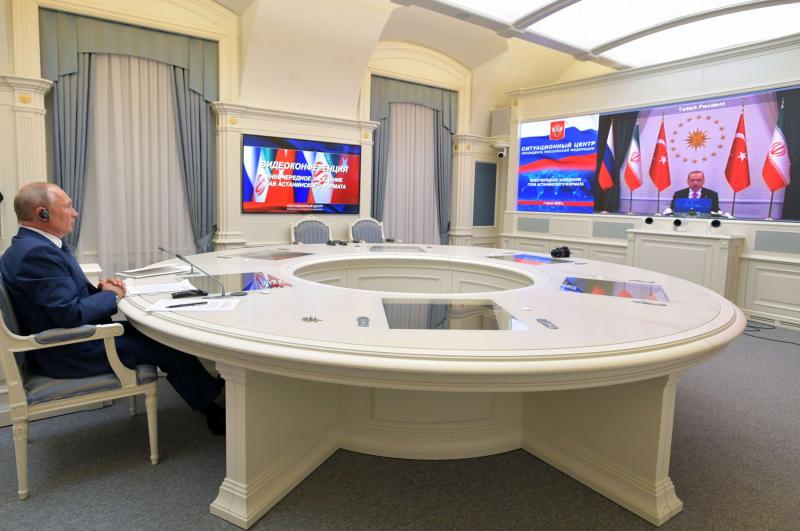BEIRUT–Iran, Russia and Turkey, which support opposing sides in Syria’s war, held talks Wednesday in what looked like an attempt to find common denominators in the war-plagued country whose conflict has entered its 10th year.
Despite their conflicting agendas, leaders of the three countries which are militarily involved in Syria, said in public statements they are fighting terrorism and are committed to peace in the country.
Iranian President Hassan Rohani, whose country has for years kept a military presence and backed radical Shia proxies in the Syrian war, said there was “no military solution” for the conflict during the video conference with his Russian and Turkish counterparts.
Russian President Vladimir Putin denounced newly imposed US sanctions that he said were aimed at “suffocating” Syria, while Turkish President Recep Tayyip Erdogan, whose army is still engaged in a massive military campaign in Syria, called for “peace” and “security” to be restored in his country’s southern neighbour.
The talks were the first since September in the so-called Astana format, three-way talks between the key foreign powers in the Syrian conflict.

In Syria’s nine-year-old war, Russia and Iran are the main foreign supporters of President Bashar Assad’s forces, while Turkey backs opposition fighters, including hard-line Islamic militants. Under a diplomatic process dating back to 2017, they agreed to work to reduce fighting.
Rohani told the conference that “the Islamic Republic believes the only solution to the Syrian crisis is political and not a military solution.”
There was no mention of Iranian military sites which face continued Israeli air strikes targeting Syrian regime troops, allied Iranian forces and fighters from the Lebanese Shia militant group Hezbollah.
“We will not allow Iran to establish a military presence in Syria,” Israeli Prime Minister Binyamin Netanyahu told reporters Tuesday.
“I say to the ayatollahs in Tehran: ‘Israel will continue to take the actions necessary to prevent you from creating another terror and military front against Israel’” in neighbouring Syria, he said.
“And I say to Bashar al-Assad: ‘You’re risking the future of your country and your regime,” Netanyahu said.
“We are absolutely resolved to prevent Iran from entrenching itself militarily in our immediate vicinity,” he added.
The Iranian president took cover under the pretext of fighting terrorism to indirectly justify Iran’s military presence in Syria. “We continue to support the inter-Syrian dialogue and underline our determination to fight the terrorism of Daesh (the Arabic acronym for the Islamic State group), al-Qaeda and other related groups,” he claimed
Putin said the objective of the conference was to analyse the situation and agree on steps “to ensure the long-term normalisation in Syria.”
“Above all, it is a question of continuing the fight against international terrorism,” he said.
“The most tense situation is still being observed in territories outside the control of the Syrian army, particularly in the de-escalation zone of Idlib and in north-eastern Syria.”
“We need to actively help advance an inclusive inter-Syrian dialogue,” said the Russian leader.

“An inclusive inter-Syrian dialogue should be actively promoted within the framework of the constitutional committee in Geneva. I propose to support this process, to help the participants to meet and start a direct dialogue,” he added.
Idlib is held by jihadist and rebel groups, some of them backed by Turkey, which has deployed forces in several military posts in the region as part of a 2018 deal with Russia.
Putin also denounced as “illegitimate” a new raft of US sanctions against Syria.
He stressed “the negative impact of the sanctions put in place against Syria, bypassing the UN Security Council.”
The Caesar Act, which took effect in mid-June, punishes under US law any company that works with Assad.
The measures have cast a cloud over efforts to rebuild the war-ravaged country.
“Despite the call from the UN Secretary-General for easing the pressure of sanctions under pandemic conditions, Washington like Brussels decided to prolong measures against Syria,” Putin told the conference.
“In addition, new sanctions presumably aimed at economically suffocating Syria have been adopted.”
Erdogan said Turkey’s “fundamental priorities are to safeguard Syria’s political unity and territorial integrity, restore peace on the ground and find a lasting political solution to the conflict.”
“We will continue to do what we can to restore peace and security to our neighbour Syria as soon as possible,” said the Turkish president.
After delivering their opening statements, the three presidents were to discuss Syria in private.
Putin said Iran, Russia and Turkey had drafted a joint statement “reflecting the harmonised approaches of the three countries towards further action.”
“Among other things, it set out the task of destroying terrorist groups once and for all and advancing the political process,” he said.
As well as Idlib, Turkey controls a stretch of territory along its border in neighbouring Aleppo province following a series of military incursions since 2016. It pursues a relentless war against Kurdish armed groups in Syria.
The conflict in Syria has killed more than 380,000 people and displaced millions.
Source: Arab Weekly



